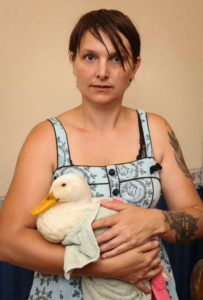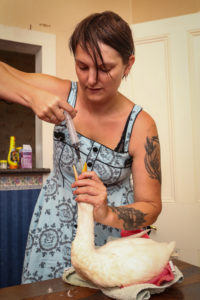
Kym Skelton recently pulled out three duck carcasses in different stages of decomposition from the Logan Carr Reserve in Botany.
The Whitford resident, who moved from Tauranga a couple of months ago is a part of the Bird Rescue group, says she has been inundated with calls about ducks being paralysed.
“They are dying like flies all over Auckland,” says Kym about the outbreak of avian botulism killing wild ducks in their natural habitats.
The mother-of-two wants more people to be aware of a severe case of duck botulism caused by bacteria which secretes toxin that causes ducks and other birds to become severely paralysed and either starve to death or drown when their heads go limp.
The disease spreads via ducks and other birds ingesting the maggots on the dead carcasses of other infected birds.
“It is also caused by people feeding bread to the ducks. When the bread reaches the bottom of the pond, it decomposes and creates bacteria. More so, when it is a warm period and there is no fresh water.”
The 32-year-old mother-of-two says they are short of volunteers who can visit parks daily and collect any sick or paralysed ducks to be taken to bird rescue in Green Bay.
“Sometimes it is a challenge to catch these ducks as some of them go limp in the middle of the swamp. You have to think of strategies of how to pull them out and sometime use a kayak or a dingy.”
Time is critical as the ducks die within roughly 24 hours from the onset and every dead duck result in many more being paralysed.

Carefully handling a Peking duck that sits still in a bird cage at her home, she removes the gunk in the eyes with a wet tea bag. She then uses a syringe and a pipe to inject electrolytes into the duck’s throat, making sure that the pipe reaches the stomach. She then gently immerses the Peking duck in a tub filled with water, to help the sick duck cool off. She worries as a pool of lice surface in the water.
“I was called by a lady who has Peking ducks in a private pond saying that she has already lost six to seven ducks and doesn’t know what is happening to them,” says the bird rescuer who works with volunteers in Howick.
Kym is glad that she has been successful in rehabilitating a mallard and a grey duck that are doing well in the shed in her backyard. She says duck botulism is not contagious to humans and can be reversed, in early cases.
“All dead carcasses need to be put in a plastic bag, tied tight and left next to a rubbish bin so that it stops transmission of bacteria. Please keep all dogs away from it since pets can be poisoned by ingesting the toxins,” she says.









